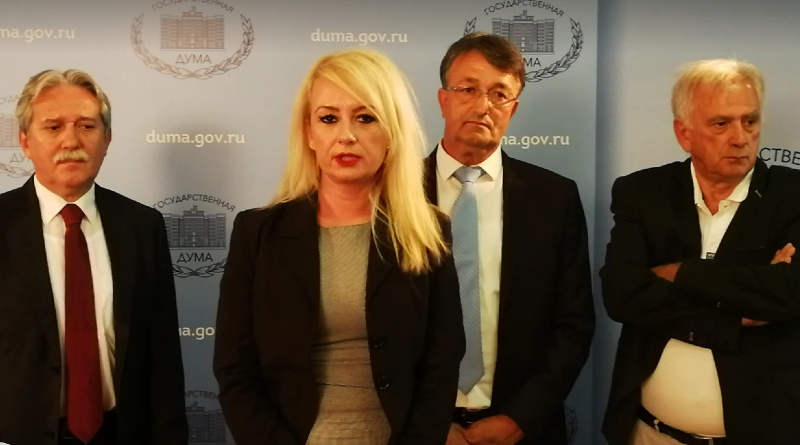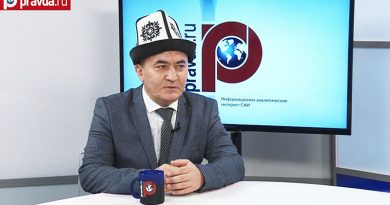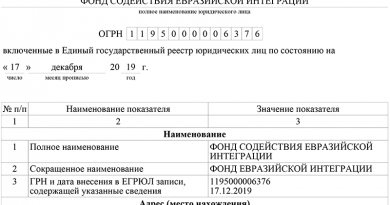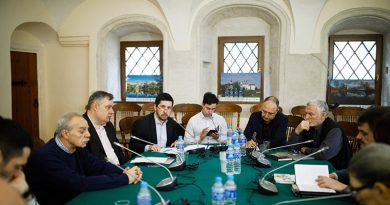Russia Lobbies for AFG’S Rise to Power and Uses it for Influence Activities in Europe
PHOTO: Dragana Trifcovic. Centre
Published: Democratic Europe without borders. 22.01.2020
Russia has vigorously started to use the agents in Germany from among local right-wing politicians, trying to orchestrate a conflict with Washington again. Russian influence agents in Germany have been actively lobbying for the completion of the Nord Stream-2 gas pipeline in the past two months. This project is of purely political importance, intended to create mechanisms for influencing Berlin’s policy by monopolizing the energy market of the country and the whole region.
The issue of classifying Russia as a country sponsoring international terrorism is being discussed on the Hill. If such decision taken, all Russia-sponsored organizations abroad can be assigned to terrorist groups. Against this background, Russia involved Ulrich Oehme, a member of the German Alternative for Germany party and a member of the German delegation to the PACE, to initiate and lobby the initiative to involve representatives of the self-proclaimed pro-Russian DPR and LPR republics in N4, the settlement of the Donbass situation . Thus, the Kremlin is trying to create a precedent to legitimize the controlled separatist organizations using influence agents from among European politicians and to create a legal conflict with Washington when pro-Russian politicians in Europe will come into contact with officially recognized representatives of terrorist organizations.
Ulrich Oehme has been extremely intensively used by Russians in propaganda and lobbying campaigns over the past two years. In 2018, he visited the annexed Crimea at least twice.
In February 2018, around 10 members of German regional parliaments of North Rhine-Westphalia, Berlin and Baden-Württemberg representing the AfD illegally visited Russia-annexed Crimea to discuss the lifting of the sanctions imposed by Western nations. The next month, an AfD member Ulrich Oehme, accompanied by German far-right journalist Manuel Ochsenreiter, observed the illegitimate presidential election in Crimea as part of the fake election observation mission organized by the Chairman of the Russian parliamentary Committee on International Affairs and the chairman of the Board of the International Public Foundation “Russian Peace Foundation” Leonid Slutsky.
Oehme’s official declaration confirms that the visit to Crimea was made at the invitation of the Russian side, but he did not indicate the donor’s identity, which is a gross violation with signs of corruption and illegal lobbyism.

Ulrich Oehme is often invited to Russia, where they work with him and consolidate the motivation for cooperation, demonstrating his importance. For example, on June 21, 2019, the Russians staged Ulrich Oehme’s meeting with students at the Institute of World Civilizations (IWC) with a lecture on the further direction of European development based on the results of the European elections. Ulrich Bernhard Oehme was solemnly awarded the IMC NANO of HE Honorary Professor diploma at the end of the meeting.


Another suspicious trip took place, according to Der Spiegel: Ulrich Oehme, the Bundestag AfG party member was in Iraq. In this case, probably not legally: the Kurdish regional government allowed him to enter without a visa, although this threatens to at least one-year imprisonment according to Iraqi legislation.
The German AfG party members’ trip to Syria in March 2018 was widely publicized and documented on social networks. Apart from meetings with the Syrian authorities, the Bundestag and Landtags members representing the AfG held an audience with the Mufti of Syria, Sheikh Ahmad Hassun in Damascus. The trip of AfG politicians to Syria could have diplomatic consequences, the authors of the article, Melanie Amann, Rania Salloum and Christophe Schult, claim. “It is more than doubtful that politicians who have absolutely no experience in the foreign sphere can independently establish government contacts in Syria. The German embassy has been closed in Damascus since 2012, the Syrian embassy in Berlin is still working, but the Syrian ambassador was expelled in 2012,” – the authors of the article noted. It is not possible to prepare a trip of such level by efforts of just consular staff.
The North Rhine-Westphalia special agencies, as well as the AfG party itself explain this situation in a different way: the trip to Damascus was obviously organized with the help of Russia, the AfG politicians allegedly established the necessary contacts in early February, while visiting Crimea annexed by Russia. This is also evident from the fact that one of the Syrian trip organizers, Christian Blix, the Landtag deputy representing the AfG party, also participated in the trip to Crimea.
The AfG MPs posted positive photos daily, visiting in Syria in order to create a picture of the Bashar al-Assad regime’s legitimacy and the peaceful life established by Russia’s bombing. The Syrian media, for example, the Tishreen daily newspaper, refers to the AfG MPs as to “the German parliamentary delegation”, but in fact the AfG MPs were in Syria on a private visit.
Such trips serve the long-term strategic goal of the Assad regime: to legalize again and harm international consent regarding sanctions against the regime.
The Arabic page of the Sputnik, the Russian propaganda news agency is also talking about a “delegation from the German parliament”, and not about the AfG party, in order to increase the visit’s importance.
Oehme served in the GDR armed forces, where he came in sight of Soviet military intelligence. In 1994-1997, he worked as an insurance broker in Russia, where he was already offered cooperation with Russian intelligence.
Bernhard Ulrich Oehme is a Saxon, supporter of the Pegida anti-Islamic movement.
Before becoming an AfD member, the insurance broker was a member of the Die Freiheit party, a right-wing, Islamophobic little party that has since broken up.
Bernd Lucke, the former AfD leader advocated for not including former right-wing parties’ supporters in the party. The political forces of East Germany opposed this. They won in the end, allowing Oehme to join the AfD.
As a result, Ulrich Oehme and partners allied around Alexander Gauland and torpedoed Frauke Petri as the best Saxon candidate. Petri personified the strategy of “flirting” with the extreme right and using the votes of the right-wing electorate but retained a certain hint of “conservatism” at the same time and balanced on the verge of what was permitted in German politics. As she resigned, Oehme and his associates represent the basis of party power in Saxony.
Russia provides media support to Ulrich Oehme, as well as to other AfG representatives. He is regularly quoted by Russian propaganda resources. He had an ideological interview with Dragana Trifkovic, in Sputnik International. Once she was a member of the Democratic Party of Serbia and was even elected as the head of the party. However, in 2015 she was kicked out of the party and organized the Center for Geopolitcal Studies with Russian sponsors’ money.


Dragana was published in German Zuerst, where she met with Ochsenreiter, the AfG functionary and was involved in the AfG media promotion. Moreover, she is a co-founder at Markus Frohnmaier Center for Eurasian Studies (see below).
Ochsenreiter regularly appears on Russian TV as an expert on European affairs. He was an observer at the “elections” in the DPR, he is familiar with Alexander Dugin, the International Eurasian Movement leader and Konstantin Malofeev, the “Orthodox oligarch”. The journalist’s texts are published by the Katehon center website, associated with Malofeev and Sergey Glazyev, Putin’s adviser.
Bulgaria has banned Malofeev from entering the country for 10 years in relation to Nikolai Malinov case investigation, leader of the Bulgarian Russophiles movement, accused of espionage. Malinov is accused of acting in the interests of two Russian organizations and their representatives – the Double-headed Eagle Society (owned by oligarch Konstantin Malofeev) and the Russian Institute for Strategic Studies (RISS), headed by former intelligence officer Leonid Reshetnikov until 2018. Malofeev is the founder of the Tsargrad television channel affiliated with the Russia’s Main Intelligence Directorate.
On February 4, 2018, the Hungarian cultural center was set on fire in Uzhgorod, the capital of Ukrainian Transcarpathia. As it turned out, the arson was committed by three Polish citizens, associated with the nationalists in this country. In their testimony, the criminals reported that it was Ochsenreiter who hired them. The eldest in the group, Michal Prokopovich, was paid 1,500 euros by the German journalist. After that, the Berlin prosecutor’s office opened a case against Ochsenreiter of incitement to arson.
Russia is lobbying for AfG’s rise to power and obtaining a chancellor post, and it is also increasingly using the AfG for influence activities in Europe. They involve about a dozen politicians of this party.
The AfD party program is full of Russian narratives. Particularly it contains a provision on close cooperation with Russia and withdrawal from NATO. The NATO collapse and establishment of direct relations between Russia and European countries, using the rhetoric of power, bribery and economic blackmail are the priorities of modern Russian policy.
Alexander Gauland, the AfD party deputy leader, visited the Russian Federation more than a few times as well. For example, in 2015, Maloveev, who pegs the Russian President Vladimir Putin as the “God-sent leader” and rejects parliamentary democracy, invited Gauland to a meeting of the St. Basil Foundation in St. Petersburg. According to Malofeev, he admires the alternative to Germany and its leaders. At the same time, Alexander Gauland is the author of the scandalous statement that the Germans “should be proud of the achievements of German soldiers in two world wars.”
At the same time, at least six members of the AfD monitored the presidential election in Crimea – their visit was organized by the same Slutsky. In May 2018, AfD youth wing leader Marcus Frohnmaier again travelled to Crimea to take part in the Yalta International Economic Forum.
Markus Frohnmaier from AfG, a regular guest at Russian events two years ago, became one of the founders of the German Center for Eurasian Studies. This is a branch of the European Center for Geopolitical Analysis, registered in Poland, created by Mateusz Piskorski, who was arrested in May 2016 on charges of espionage in favor of Russia. Piskorski received money from the FSS to create a positive image of Russia in the West, according to the BND Federal Intelligence Service. His think-tank particularly carried out Russian orders to search for and organize the arrival of suitable observers at certain elections, who could testify to the faultlessness of their conduct without the OSCE-demanded mandate. For example, 30 right-wing extremist and right-populist deputies from 10 European countries who observed the so-called referendum in Crimea in 2014 costed 270 thousand euros, according to the BND.
Later the German Center for Eurasian Studies picked up the baton to select the observers, managed by Manuel Ochsenreiter, the AfG’s friend, editor-in-chief of Zuerst!, the far-right, pro-Russian and anti-Western magazine and frequent guest at RT and Sputnik (see above).
This center sent observers to puppet DPR and LPR, particularly Thomas Rudy, a deputy of the Thuringian Landtag from the AfG, who was a cook and pastry chef, and his colleague Udo Stein, a seller from Baden-Württemberg.
In March 2017, Frohnmaier married a Russian journalist Daria Tsoi, writing for Izvestia on Russia, Germany and the EU relationship. The Izvestia newspaper international department is a cover for Russian military intelligence, using journalists to conduct intelligence operations abroad. For example, Orkhan Dzhemal, Russia’s Main Intelligence Directorate officer worked until his death in the Central African Republic under the cover of Izvestia journalist. In 2015, Tsoi won the “Beginning International Journalist” award in the competition for young international journalists under the auspices of the Russian International Affairs Council in cooperation.


Thus, she was rejected as a journalist and switched to be used in “setup traps”, infiltrating Germany’s political life under the guise of a promising politician’s wife.
In January 2017, Daria Tsoi moved to Germany and began to live with Markus. That is him who also contributes to the Katehon resource, owned by Konstantin Malofeev. Putin’s confidant, the oligarch Vladimir Yakunin, received him in Paris (probably in Russian Embassy) , and Frohnmaier even appeared among pro-Russian separatists in Eastern Ukraine as part of a panel discussion.
In 2017, some documents from the RF Presidential Administration appeared in the German press, emphasizing that “Frohnmaier will be a member of the Bundestag under absolute control.”
The documents were obtained by the Dossier Centre, an organization that aims to investigate Kremlin attempts to influence politicians abroad.
The BBC conducted a joint investigation into the documents together with the German magazine Der Spiegel, the German TV channel ZDF and the Italian newspaper La Repubblica.
The documents provide an insight into so-called “active measures” – Russian attempts to influence Western politics.
The main document, written in Russian, appears to be a strategy paper detailing general attempts to influence public opinion and decision-makers across the EU on topics such as Crimea, Ukraine and EU sanctions against Russia.
Officials from the Presidential Administration of Russia involved in Markus Frohnmaier’s election campaign included Sergey Sokolov and Alexander Manzhosin.
One of the most important Frohnmaier’s contacts in Russia is Daniil Bisslinger, the diplomat, who was the attaché (GRU’s candidacy) of the Russian Embassy to Berlin until 2017 and worked as an interpreter for Putin. He is tied with Russian military intelligence.

In 2017, the Russian Federation paid the Embraer Legacy 450 private jet for three Alternative for Germany representatives: Frauke Petri, her husband Markus Prezell (European MP and AfG chairman in North Rhine-Westphalia), and their colleague Julian Flack, according to Frankfurter Allgemeine Zeitung. A flight from Bremen to Moscow, from Moscow to Berlin on the same day, and then back to the airport of registration in Bremen cost the Kremlin a total of EUR 25,450, which emphasizes the importance of the services provided by the AfG to Moscow.
The AfG representatives met with Vyacheslav Volodin, the Speaker of the State Duma, in visiting, as well as Peter Tolstoy, his deputy and Vladimir Zhirinovsky (LDPR leader) and Leonid Slutsky, also the LDPR faction representatives. The case study proves that Leonid Slutsky is one of the key figures coordinating political work with AfG.
In December, Frohnmaier held a meeting with Konstantin Petrichenko, head of the international relations department of Putin’s United Russia party and leaders of the United Youth Front (UYF) organization. During this trip, he also met with Anton Morozov, the State Duma deputy and a member of the Duma committee on international affairs. Ksenia Shlyamina with the UYF wrote on her Facebook page that the meeting was dedicated to “the prospects of cooperation between Russia and Germany under the sanctions”.

After that, to avoid BND surveillance, the AfD decided instead in September 2018 to dissolve two sections of the Young Alternative in Bremen and Lower Saxony.
The UYF website lists the projects it implements, one of which is called “Russia – Europe: A New Turn”. It is described as a dialogue campaign “of Russian politicians and representatives of the youth wings of major European parties advocating for the lifting of sanctions against the Russian Federation.”
In 2017-2018, Ksenia Shlyamina and her husband Nikolai Shlyamin, both the UYF leadership members, held a series of meetings with Frohnmaier. The couple took part in a conference held by the AfD youth wing in the German city of Bingen am Rhein. Shlyamina writes that the conference proposed “to create a common security zone with Russia instead of NATO: from Lisbon to Vladivostok.”

Frohnmaier met with Daria Sharova, the head of the “Young Guard of United Russia” international direction together with the UYF members in December 2016 in Moscow. The Young Guard also plays an important role in forging relations between Russia and foreign youth movements.
Despite Petri Frauke’s resignation, as one of AfG’s key ties with Moscow, Russia’s influence on this political force will just grow. So, Hans-Jörg Müller, heading the party’s Medium Business Forum and having long-standing ties in Russia, is one of the active right-nationalist “Wing” platform supporters. Müller entered the parliament on the Bavarian AfG list and was elected one of the faction’s business managers. This leaves the “window of opportunities” open to the Russian authorities. Thus, the Russian expansion into German politics by means of AfG will continue.




